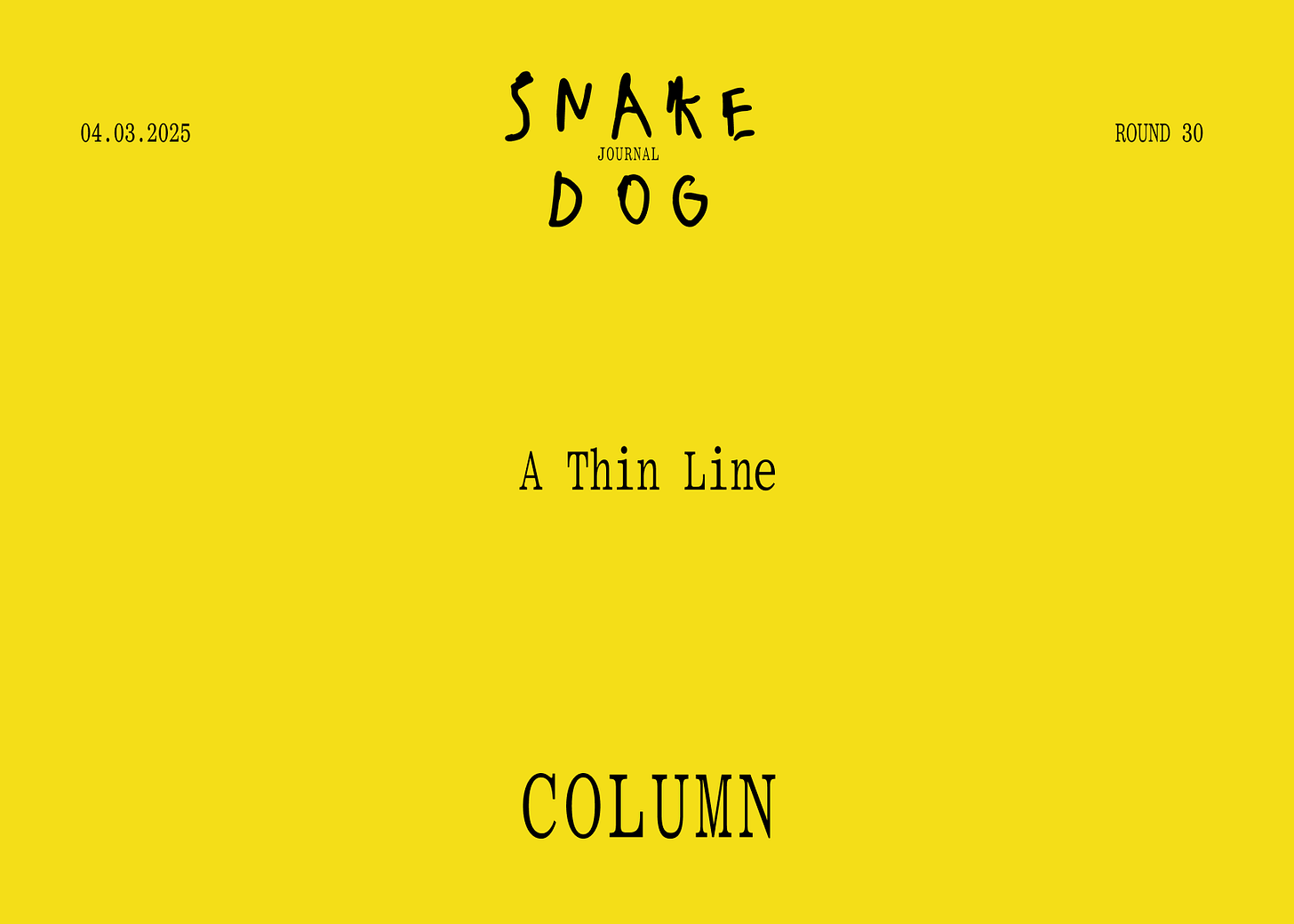A THIN LINE
Notes from the razor’s edge
I just watched the most recent episode of The White Lotus [spoiler-ish alert] and it finds Frank—masterfully embodied by Sam Rockwell—on both sides of a razor’s edge.
In the storyline, the distance from herbal tea and Buddhist living to “You know what, God damn it, I think I might have a drink after all. Could I get a whisky, darling? One wouldn’t hurt,” to a hotel room full of strippers and fat rails to be hoovered up, is measured in hours. Hours.
10 months of sobriety (or 10 years) can evaporate in an instant.
This is a binary with which all of us sober folks coexist.
At any time, it could be over.
Of course, The White Lotus is an intoxicatingly genius TV show. It's darkly comic. It’s dramatic. But as a sober watcher, that’s the realest sh*t I’ve seen this year. I laugh. But there’s another part of me that’s not laughing. And that’s the part saying, “that could be me," which is quickly quieted by the part saying, “that would be me.”
It shouldn’t be. My whole life is preventative measures. My program. My daughter. My marriage. My living amends. That’s my recovery.
But be it me or anyone else, when it ends, it’s over.
Many, many full moons ago, before notching a decade of continuous physical sobriety, I had a couple months under my belt. And I had one little tequila. Just one. And shortly thereafter it was The Ace of Spades on 8 Mile Road, shady dealers, night terrors, insanity, incomprehensible demoralization. All in a seersucker suit. And this went down in a matter of hours.
"Going out" doesn't keep me up at night. I don’t think of it as a kind of scythe wielding reaper, ever watching, ever waiting for me to f*ck up.
Honestly, I don’t give it a lot of thought.
But when I see it on the small screen, I can play out the tape. I remember that I’m a werewolf or I’m Cinderella, dodging full moons and midnights one day at a time.
Point being: When it's on it's on. When it's off it's off. No substitutions.
You can’t be a little bit sober. Or mostly sober.
And while I’m on the subject, if you’re in a conversation with a sober cat and you start a sentence with, “I’m basically sober except for…” the only appropriate conclusion to that sentence is, “Actually, how about the Lakers? You think they actually have a shot this year?”
Do I? No.
There is a daytime. And there is a night time. When one ends the other begins. Yet we project our elaborate, romantic fantasies onto dawn and dusk. As alcoholics, we wish to exist forever in the in-between, to make every hour golden hour.
What if I could control my drinking? What if I could just drink on the weekends? What if I only drink unfiltered Belgian beer? What if I only drink French Champagne with French women in French cities? I’ve filled up notebook after notebook with these fantasies. The only thing that ever worked was annihilating the “in-between” and committing to one side of the binary.
You’re either sober or you’re not sober. You don’t get to be both.
And when it’s over, it’s over. To quote Frank, once you go out, “That ship has sailed.”
It’s fitting that Frank’s deepest sexual fantasy—on which he expounds in his epic episode five monologue in terms that would likely stir the souls and loins of both Freud and Jung—is to be both the subject and the object of his desire at the same time. Or in his words, to be the railed and the railer.
Finding this impossible, he walks away. He tries on sobriety. And then he goes out. Spectacularly.
We’ll need to tune in next week to see where this goes. But, of course, we know where this goes—futile attempts to control the uncontrollable, to be someone else, i.e., the one someone none of us can ever be.
We can never be what we aren’t.
Frank can never be “one of these Asian girls getting fucked by me.”
And I can never be a “normal drinker.” And neither can he for that matter (and perhaps therein lies the punctum of his particular sexual preoccupation).
There's a common refrain among sober folks that the seemingly erratic debauchery was somehow "boring" in hindsight. Whereas the seeming monotony of clarity is vastly more interesting.
What could possibly explain that?
I think it’s about tension.
Not stress. (Though, I have plenty of that.)
It's the tension between what is and what isn't. It's tension on a cellular level, a Big Bang level, a God level, which I'd argue are the same thing.
It's the anticipation of being and not being.
The expectation of the cocaine or the carnal is often more exciting than the actual thing, you know?
The release of that tension—one night in Bangkok—that is captured in the final minutes of last week’s White Lotus is robotic, monotonous, sad. The intensity (or eros) of monologue Frank is gone. And there’s nothing all that sexy about what’s left.
When I got sober, I just wanted to stop drinking, to stop calling “the guy.”
It couldn’t possibly have occurred to me that I was embracing a manner of living that mimics an intrinsic and universal truth—that we either are or we aren’t. All of us. Every living thing. No exceptions.
This is a crazy way to live.
And I wouldn't have it any other way.


